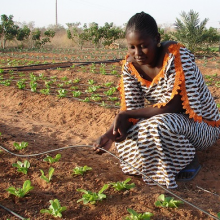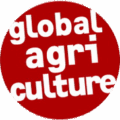
Improved agricultural water management could help produce more food with the same amount of water and buffer potential climate change impacts on crop yields, according to new research published in the journal Environmental Research Letters. The scientists analysed the worldwide potential to increase food production by improving rainwater use and irrigation. “Smart water use can boost agricultural production – we’ve in fact been surprised to see such sizeable effects at the global level,” said lead-author Jonas Jägermeyr from the Potsdam Institute for Climate Impact Research (PIK). Under a scenario described as ambitious but achievable, the use of integrated water management strategies could increase global food production in kilocalories by as much as 41%. The researchers say this could halve the global food gap, assuming that the world will need 60%-100% additional crop calories by 2050 to eradicate hunger. Although the scientists do not question these figures – the world’s farmers are already producing enough to feed 12 billion people – and do not explain how a mere increase in production will improve the access to food for the poor, they show the enormous potential of clever water management. “It turns out that crop water management is a largely underrated approach to reduce undernourishment and increase climate resilience of smallholders,” Jägermeyr said. The scientists took into account a number of very different concrete water management options, from low-tech solutions for smallholders to the industrial scale. According to the study, water harvesting by collecting rainwater for irrigation during dry spells is a common traditional approach in some regions such as the Sahel region in Africa. But it is under-used in many other semi-arid regions in Asia and North America. Mulching is another option since covering the soil with crop residues left on the field can reduce evaporation. In addition, the potential of drip irrigation has not yet been fully exploited. Especially in water-scarce regions such as in China, Australia, the western US, Mexico, and South Africa, there is a lot of potential to increase yields through better crop water management. The study also highlights the important role of water management in reducing food risks under climate change. According to co-author Johan Rockström from the Stockholm Resilience Centre, improved water management and more research in this area will be key to limiting pressure on our national resources and achieving a sustainable food future. “The recently adopted Sustainable Development Goals by all countries – while stipulating sustainable agriculture among all nations – need to be based on more evidence on how to achieve such large system changes, and water needs to be central here. Since we’re rapidly approaching planetary boundaries, our study should indeed draw the attention of decision-makers of all levels to the potential of integrated crop water management.” (ab)
